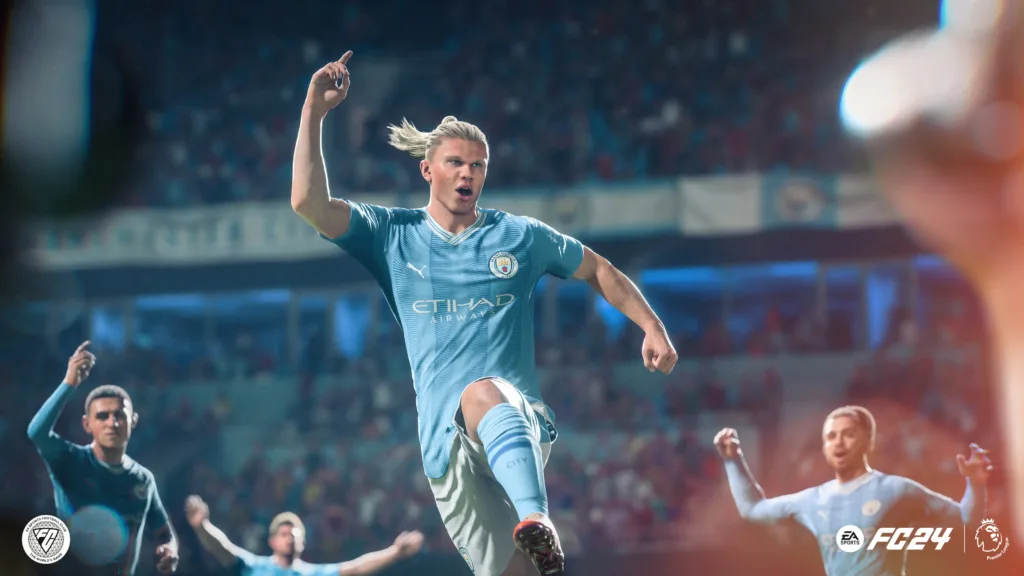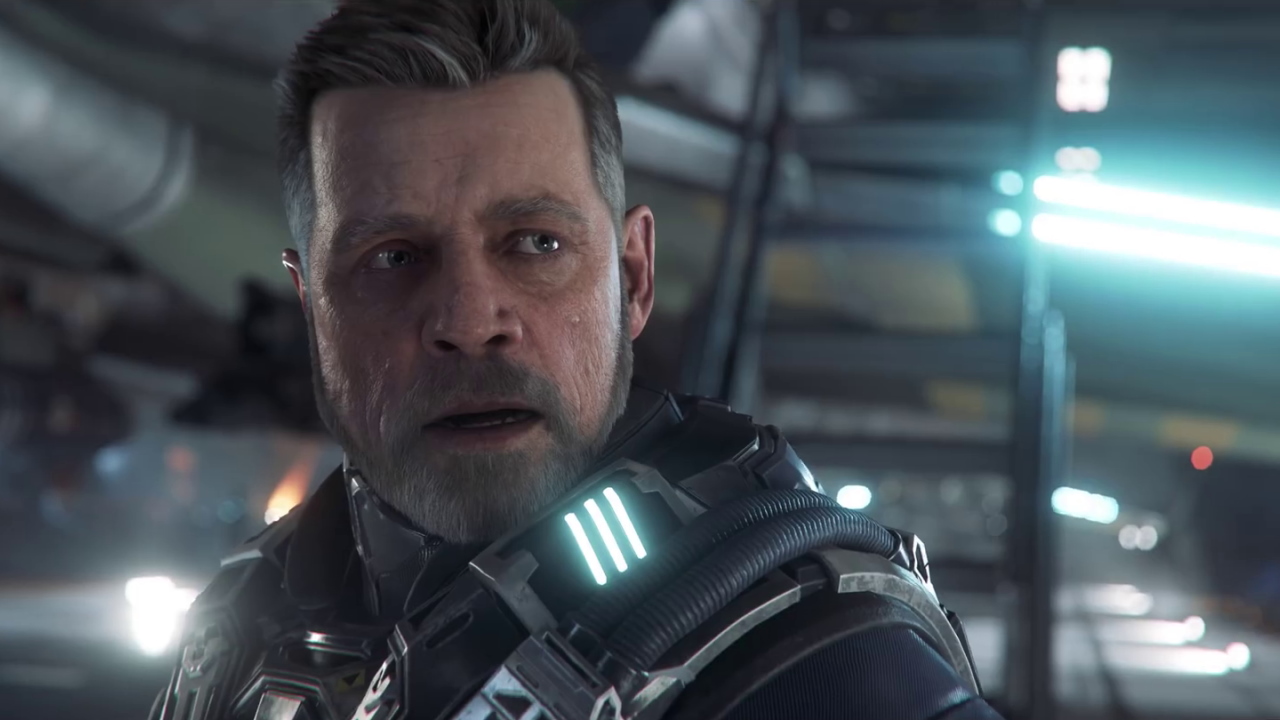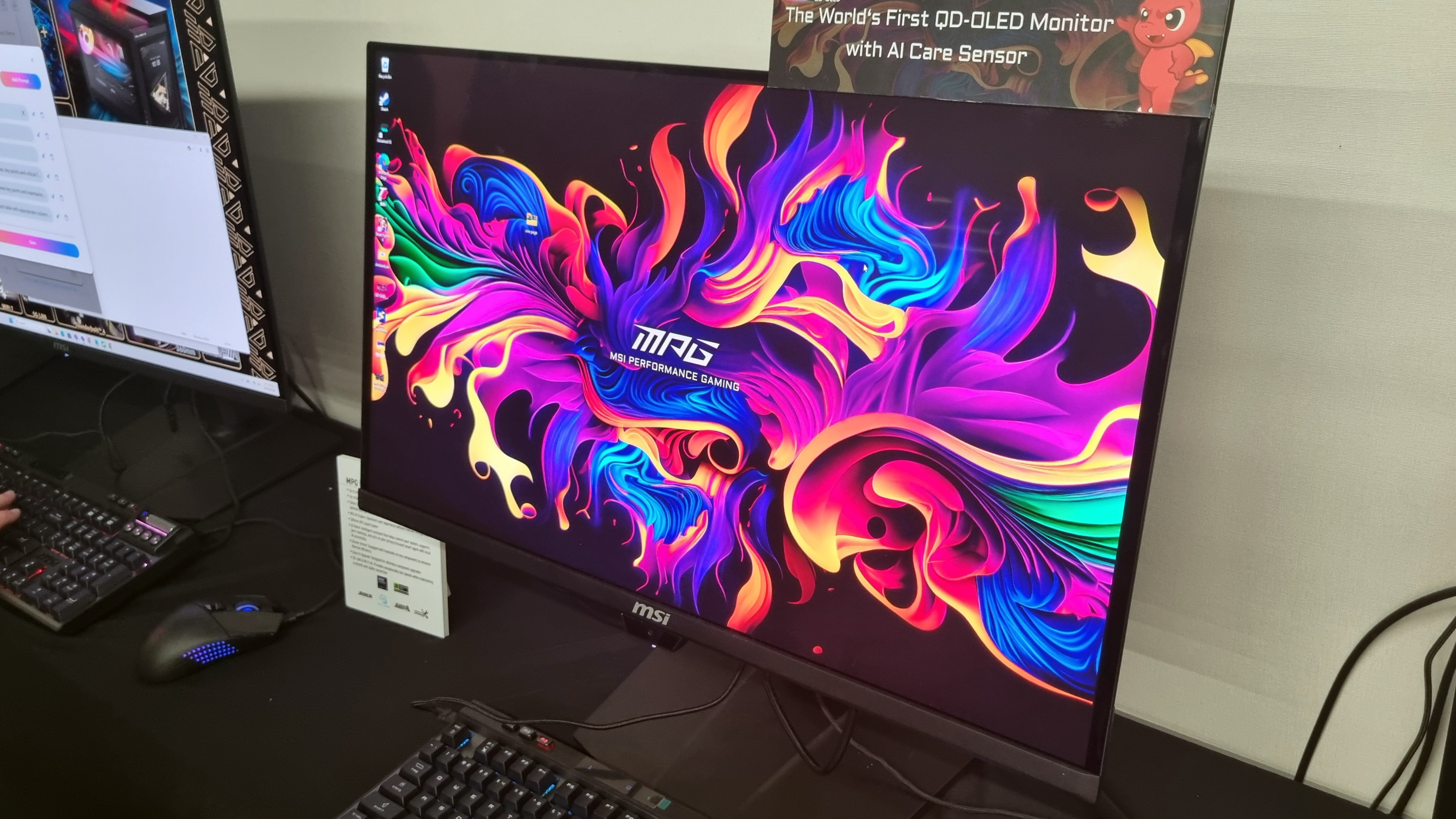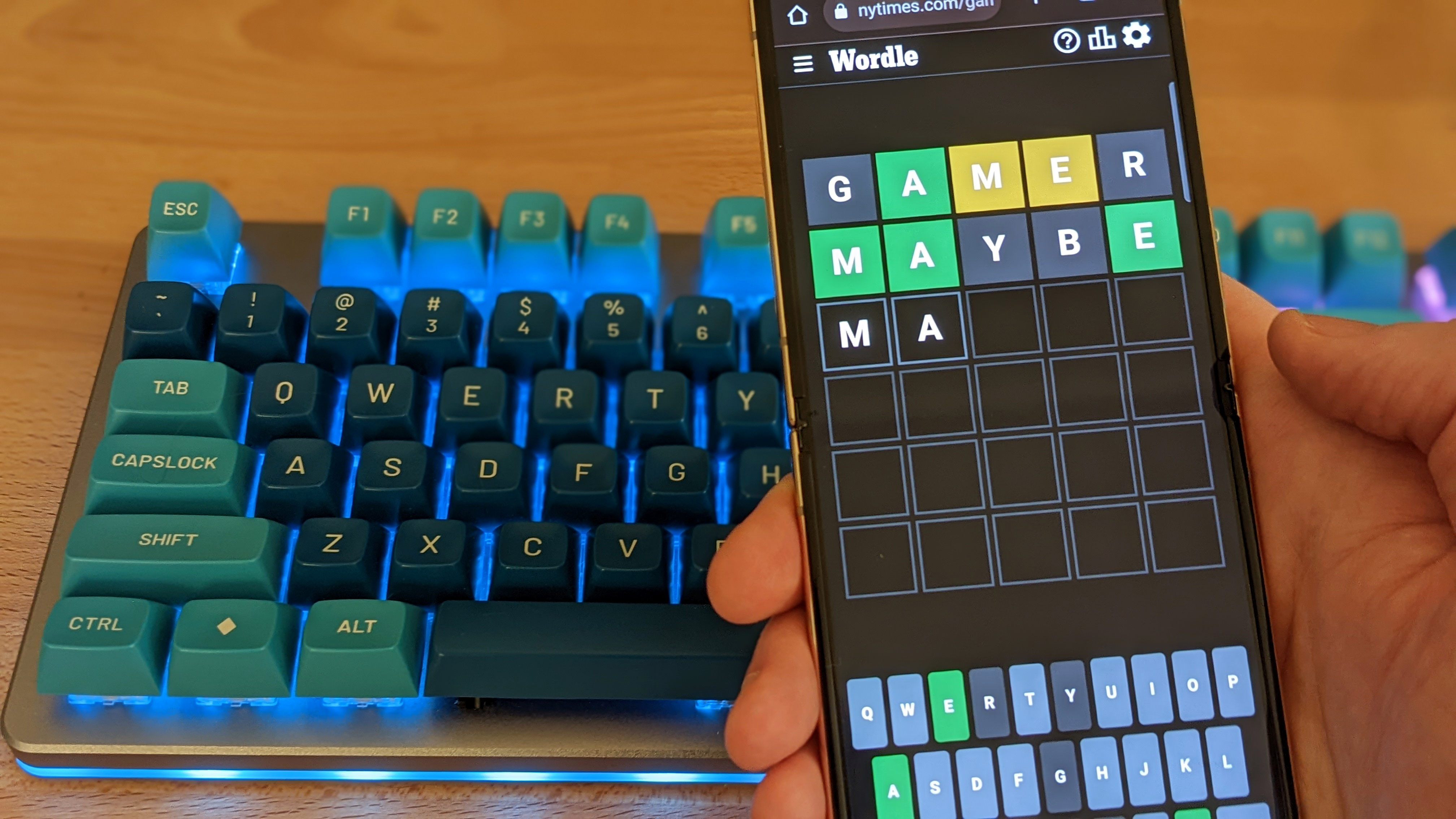
EA Sports has unveiled FC 24, its first non-FIFA football game following last year’s breakup between the two once famous friends. But don’t expect a revolution on the virtual pitch to accompany this big-budget rebrand. Instead, expect welcome quality-of-life improvements, a few positive gameplay tweaks, and a significant change to Ultimate Team that could dramatically shake up the competitive online meta.
After extensive hands-on time with FC 24, it’s safe to say this year’s game looks and feels like what you’d expect from a FIFA 24. There are loads of new animations – there always are loads of new animations – for FC 24 and you do notice them during gameplay. Erling Haaland’s stunning karate kick goal for Man City against previous club Borussia Dortmund in last season’s Champions League is in the game, for example. So is Haaland’s unique running style, his long arms waving about behind his arched back.
FC 24 has a long list of PlayStyles that make a player much better at a specific thing. They’re in Ultimate Team, too, which means the inevitable Team of the Week Haaland (I do not blame EA Sports one bit for drenching FC 24 with all things Haaland given the season he’s just had) may include the Power Header PlayStyle. Just what the world’s most overpowered goal machine needs: more power.
Brand wise, FC 24’s “PlayStyles” logo has a diamond in between “Play” and “Styles”. This is reflected in-game: you’ll see a player’s Play(insert diamond here)Style pop up above their head when they’re on the ball. It’s a bit distracting and rather pointless. Players, particularly fans of Ultimate Team, will know which PlayStyle their players have. Best to turn this visual indicator off once you get sick of it.
Will these PlayStyles, particularly the extra special PlayStyles+, end up overpowered? It’s a fair question at this stage. The hope is their sheer number will help keep gameplay balanced. The fear is one in particular will be deemed essential for online play, and encourage a single way of scoring. The hands-on build included just two men’s teams (Man City and PSG) and two women’s teams (Chelsea and Lyon), each of which was packed with high-rated players, so it was hard to tell if a particular player benefitted much from the addition of a PlayStyle. But these power-ups will probably prove the difference-makers at high-level online play.
More interesting pitch-side is the addition of Precision Passing input commands. There are three types (we’re using PlayStation controls here): the Precision Pass (R1 + Through ball); the Precision Lob (R1 + Lob); and the Swerved Precision Pass (L2 + R1 + Through ball). Each type paints a line on the pitch that shows the direction of the pass you’re about to attempt. In-game, these passes feel like the manual passing of old, so it’s not an entirely new idea. They’re tricky to land, particularly the Swerved Precision Pass, which, when used on a DualSense controller, forces you into a bit of a claw hand position. But they’re highly rewarding. EA Sports took inspiration from Kevin De Bruyne (yes, another Man City player – senior game design director and lifeline Man City fan Matt Prior must be loving this). The midfield maestro’s delicious passes, those defense-splitters that bamboozle camera operators as much as they do hapless opponents, are now possible, EA Sports says. Here, perhaps, hides FC 24’s true skill gap; not to be found in big brain tactics or meta-positive Team of the Week cards, but in the mastery of the wrist-straining Swerved Precision Pass.
It’s worth pointing out the new Controlled Sprint, thankfully triggered by a simple input command (Hold R1 on PlayStation). This dribbles the ball at a pace a step slower than a sprint, but fast enough to demand attention from defenders. Inspiration once again comes from Man City players who have the knack of touching the ball away from a defender’s outstretched leg at the last millisecond. Think the dribbling expertise of Bernardo Silva, Phil Foden and Jack Grealish. On the virtual pitch, the Controlled Sprint feels great, and there’s a satisfaction that comes from darting away from tackles at the last minute. There’s an equally potent frustration that comes when you’re on the receiving end, too.
Talking of outstretched legs, you’ll see defenders affect the ball more than in last year’s game. This is a trait of some defenders who are known for their interceptions and blocks. Think Andrew Robertson from Liverpool (finally, we leave the Blue side of Manchester behind!) nipping in front of an attacker who’s about to tap the ball into the empty net. You’ll also notice the ball sticks to the feet of successful slide tacklers rather than bounce about in some random direction, as it tends to in FIFA 23. Goalkeepers, too, tend to keep even stinging shots close to home, rather than parry them away as they often do in FIFA.
Beyond all that, though, the FC 24 gameplay experience is remarkably similar to FIFA 23’s. The latest version of EA Sports’ motion capture tech is called HyperMotion V (the V stands for volumetric data) but it’s hard to feel any significant impact of this in-game. The visuals are slightly better, but to be brutally honest, FC 24 looks a lot like FIFA 23 when you’re actually playing a match. Well, apart from all the new augmented reality stats that pop up on top of the pitch when there’s a break in play. Want to see where the last five shots (all from Haaland, no doubt) were kicked from? You might find out as the keeper gets ready for a goal kick. Want to see your top five most fatigued players? FC 24 may highlight them as you prepare to take a throw-in during the second half. There are a lot of overlay stats such as these, and they show up frequently. The goal here is to give the player useful information during the flow of a match so you’re less likely to press pause and fiddle about in a menu. It’s a cool idea, but it can be a tad distracting.
Graphics improvements are more noticeable in cutscenes such as replays. Here, player faces, especially those belonging to famous players, really do approach photoreal (the unintentionally hilarious Ultimate Edition cover was never an indicator of in-game graphics). There’s “GPU Cloth”, which simply means tops and shorts crease more realistically as players move about. Players have more realistic physiques. For example, ex-Wolverhampton Wanderers winger Adama Traoré looks even more like a bodybuilder in FC 24 than he did in FIFA 23. There are more realistic hands and fingers. Take that, AI.
You know gameplay changes are underwhelming when you get excited by menus. Anyone who’s played a FIFA game for any decent length of time will tell you the menus are annoying. They’re slow to load, fiddly to navigate, and boring to look at. To give EA Sports credit, it used the switch to FC as an opportunity to significantly overhaul the menus. It’s impossible to say whether they’re faster to load at this point, given the hands-on took place in an offline environment, but the new vertical orientation means navigation is at the least straightforward. You’ll also see “live video” in-menu, which is a nice touch.
EA Sports also deserves praise for adding women to Ultimate Team (we can’t call this FUT any more… so just UT?). This alone is a significant moment for FIFA’s most popular and most controversial mode, but the developers went one step further and mixed men and women so they can play together for the first time in Ultimate Team. It’s a brilliant decision, but it’s already sparked some vile, sexist, and misogynistic reaction online, all in the name of “authenticity”. Yes, FIFA and now FC are pitched as football simulations, and EA Sports insists authenticity is one of its tenets. But the developer also rightly recognises Ultimate Team for what it really is: a fantasy. This is a mode that already lets current and retired players (some dead!) play in the same team in a stadium filled with anime cosmetics. But it’s also a mode in which promo cards demand a suspension of disbelief. FIFA 23 turned some famous players into Marvel superheroes: Argentinian legend Javier Mascherano was transformed into “Octo-Boss”, and ex-England striker Peter Crouch became an actual robot – a transformation inspired by his famous goal celebration. Meanwhile, the Shapeshifters promo grants outlandish position changes and huge stat boosts to players. Goalkeepers can be outfield players and outfield players can play in goal. One of the best strikers in Ultimate Team right now is ex-Chelsea goalkeeper Petr Čech. Really.
So it should come as no surprise to learn that in FC’s Ultimate Team, female card stats are relative to the competition the player plays in. This means Chelsea’s star forward Sam Kerr, who dominates the Women’s Super League, carries the stats worthy of a 91-rated WSL player into Ultimate Team. Of course, women players tend to be shorter (the potency of height in FIFA will no-doubt port across to FC) and have slimmer physiques than the male players, but they’re often just as agile. In fact, the preview build bore this out: games between the men’s teams felt sluggish compared to the faster-feeling games between the women’s teams.
It’s too early to make definitive statements about Ultimate Team meta ahead of launch (there’s nothing quite like tens of millions of players flooding a competitive video game to make a mockery of your well-intentioned predictions), but it’s not beyond the realm of possibility that high-rated women players end up dominating forward lines. How about a front three of Sam Kerr, Ada Hegerberg, and Alex Morgan?
EA Sports confirmed Ultimate Team’s controversial card pack system remains largely the same, which stamps out any hope this new era may have sparked something of a rethink among the publisher’s top brass. EA Sports executives will no doubt point to Ultimate Team’s new Evolutions feature, which lets you improve a qualifying card’s stats, rating and design via the completion of objectives, as yet another string to the bow of “player choice”. But there appears to be no significant change to Ultimate Team’s grubby, exploitative, pay-to-win underbelly. Given the billions the loot boxes bring in, it was probably fanciful to think there would be.
The addition of women into Ultimate Team deserves to grab the FC 24-related headlines, but there isn’t much competition. FC 24 is probably the game FIFA 24 might have been had EA Sports and FIFA remained pals. There are a handful of notable changes and additions, but FC 24, when you break it down, offers yet another incremental upgrade in EA’s long-running football series. FC 24 still has the silly power shot from FIFA 23 no-one uses. FIFA 23’s Accelerate run system, which spawned a furore around overpowered “lengthy” players, returns with even more acceleration types. And while Pro Clubs, now simply called Clubs, benefits from the long-awaited addition of cross-play, it still feels like a second-class citizen compared to the cash cow that is Ultimate Team. Plus ça change…
That is not to say FC 24 offers a poor game of video game football. On the contrary, it’s a lot of fun, as is its predecessor. Fans will seamlessly transition from what was to what is and enjoy all the improvements and changes EA Sports has made. But while EA Sports has clearly spent a huge amount of time, energy and money on this most crucial of brand reinventions, there’s a safeness to the game itself. EA Sports has so far struggled to explain what is now possible in the FC series that was impossible in the FIFA series. Perhaps that will come later. For now, FC 24 is FIFA in all but name.
Wesley is the UK News Editor for IGN. Find him on Twitter at @wyp100. You can reach Wesley at [email protected] or confidentially at [email protected].







